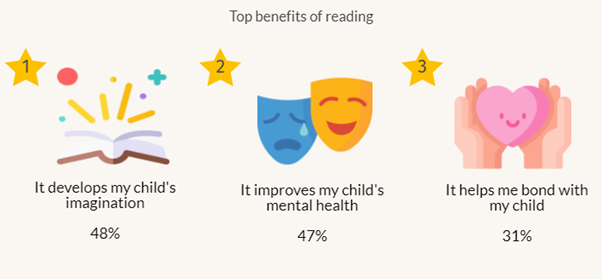We have spoken a lot recently about screen time and how screens have been used over the past year, including the shifts that have taken place in response to our changing routines and the way it has brought families closer together…but what about books, what role have they played?
With World Book Day celebrated this week we wanted to delve deeper into kids’ reading and why books remain to be so important in kids’ worlds.
Let us start by saying that much like screen time, reading has also seen a surge in popularity, with half of parents telling us that their children have read more books over this period and particularly during lockdown – and there has been more than of one of them!
So, why have kids also turned to books? What do they love about books? And what are the benefits parents associate with their child reading books?
In our last blog we discussed timeless classics and how there are certainly some core elements within content that keep kids coming back time and time again – what kids love about books is no different! It’s all about being immersed in an imaginary world, that takes them on a journey with their favourite characters. It’s no surprise then that those characters and stories that translate within books and on screen are particularly popular, with kids love of the brand transcending platform or medium.
There are differences that exist among kids and what they look for and want in a book that brands need to be aware of to engage with them most successfully across different ages. At pre-school age it is also important for brands to understand the role of the parent and wider family when it comes to reading books. Let us touch on then a few of these differences that we know exist between younger and older children, whilst also being aware that within this there are variations at a more granular level.
For many pre-school children a book can be one of the first gifts that they receive. At this age whilst the narrative and characters remain simple in nature the role that a book can play is multi-faceted. Parents use books to bond with their child, help their mood or relax them before bedtime and help them to learn new words and eventually to read. When we asked parents at what age their child started reading their favourite book series, over a third said that this was earlier than 4 years old.
Younger aged kids find comfort and security in books with smaller worlds that include things that are familiar to them and reflect their own surroundings. Key buildings or places that ground a narrative such as a home or school, with core reliable characters at the epicenter, provide a sense of familiarity and are points of reference to base a narrative around.
At this early age it isn’t only about what the child enjoys but it is also about books that the family can enjoy together and with many kids unable to read before they are 5 years of age it is an experience that is shared, and we know that now more than ever, shared family experiences are what we are looking for.
As kids get older the worlds they read about are able to expand and become more multi-dimensional, with different groups of characters interacting with each other and moving in and out of the chapters. There are also other elements which become important as they get older beyond the narrative and the characters, such as the author, and the ability to read more than one book within a series to continue the story to the next stage.
Whilst entertaining kids through a strong narrative and relatable characters is undoubtedly important in order for kids to engage, books also provide a medium on which brands can inform on issues that can be hard to discuss or explain.
When we spoke to parents about the benefits of reading for their child close to half (47%) said that it helps to improve their child’s mental health. We discussed earlier in this piece kids engaging with worlds that they understand and that reflect their own, so ensuring books paint a true picture of the world around us is particularly important. As we recently celebrated LGBTQ+ History Month the role that books can play in terms of teaching about equality and inclusiveness is a timely example of this, with great examples of kids’ books that have done this successfully being, ‘Me, My Dad and the End of the Rainbow’ by Benjamin Dean, and ‘Julian is A Mermaid’ by Jessica Love.

So, whilst it is key for brands to understand the core drivers of engagement that gets kids’ reading, it is also important to understand the broader needs that books fulfill outside of entertaining, with an element of social responsibility in reflecting a world that we want to live in. Books are a great way for kids to start to engage with a brand from a young age and can springboard them into connecting with the characters and stories across multiple mediums. Whilst books must entertain and feed kids imaginations, they must also provide information and messaging to help them navigate the story of life.

Leave a comment